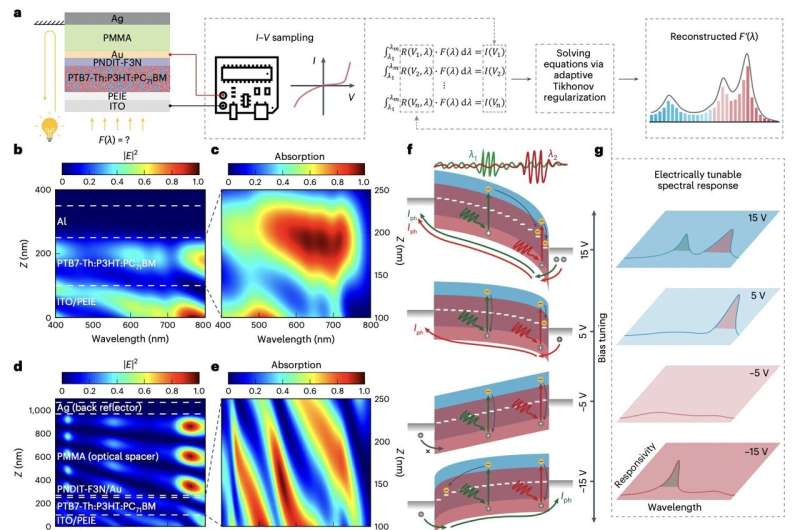
JULY 20, 2024 by Ingrid Fadelli , Tech Xplore
Collected at: https://techxplore.com/news/2024-07-micro-sized-optical-spectrometer-visible.html
Optical spectrometers are versatile instruments that can produce light and measure its properties over specific portions of the electromagnetic spectrum. These instruments can have various possible applications; for instance, aiding the diagnosis of medical conditions, the analysis of biological systems, and the characterization of materials.
Conventional spectrometer designs often integrate advanced optical components and complex underlying mechanisms. As a result, they are often bulky and expensive, which significantly limits their use outside of specialized facilities, such as hospitals, laboratories and research institutes,
In recent years, some electronics engineers have thus been trying to develop more compact and affordable optical spectrometers that could be easier to deploy on a large-scale. These devices are typically either developed following the same principle underpinning the functioning of conventional larger spectrometers or via the use of arrayed broadband photodetectors, in conjunction with computational algorithms.
Researchers at the Chinese University of Hong Kong and other institutes in China recently designed and fabricated a new micro-sized, portable and cost-effective optical spectrometer. This alternative spectrometer, presented in a paper published in Nature Electronics, is based on an organic photodetector with a bias-tunable spectral response.
“Miniaturized optical spectrometers could be of use in portable and wearable applications,” Xie He, Yuanzhe Li and their colleagues wrote in their paper. “Such devices have typically been based on arrays of photodetectors that provide distinct spectral responses or use complex miniaturized dispersive optics. However, these approaches often result in large centimeter-sized systems. We report a micro-sized optical spectrometer that is based on an optical-spacer-integrated photomultiplication-type organic photodetector with a bias-tunable spectral response.”
The new optical spectrometer developed by these researchers is based on a newly introduced method to manipulate the wavelength-dependent location of photocarrier generation in photodiodes. This technique relies on the use of a trilayer contact comprised of a transparent back contact, an optical spacer and a back reflector.
The team combined this contact with a Schottky diode and an organic ternary bulk heterojunction, to create a photomultiplication-type organic photodetector (PM-OPD). The recordings collected by this photodetector were then analyzed by a reconstruction algorithm.
“The approach allows the computational reconstruction of an incident light spectrum from photocurrents measured under a set of different bias voltages,” He, Li and their colleagues wrote. “The device, which has a footprint of 0.0004 cm2, is capable of broadband operation across the entire visible wavelength with a sub-5-nm resolution.”
The researchers evaluated their miniaturized optical spectrometer in a series of tests and found that it achieved remarkable results, operating across the entire visible spectrum regime (~400–760 nm) with a sub-5-nm resolution. To further demonstrate the potential of their design, they used it to fabricate an 8 x 8 spectroscopic sensor array for hyperspectral imaging (i.e., a technique that can detect the unique spectral signatures of specific objects by processing information across the electromagnetic spectrum).
In the future, the new approach introduced in this paper could inspire the development of other similar micro-sized and more affordable optical spectrometers. These devices could, in turn, be used to create new cutting-edge technologies that could advance research and medical practices.
More information: Xie He et al, A microsized optical spectrometer based on an organic photodetector with an electrically tunable spectral response, Nature Electronics (2024). DOI: 10.1038/s41928-024-01199-9
Journal information: Nature Electronics

Leave a Reply